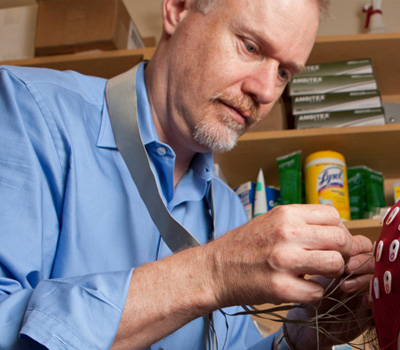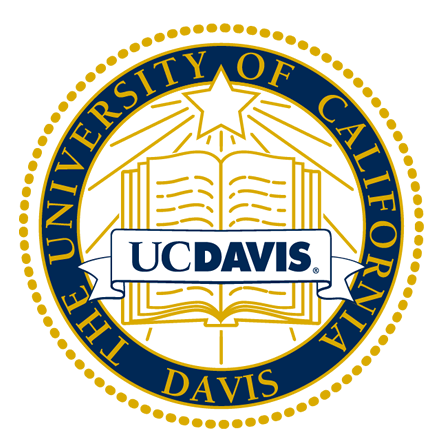Combining basic and clinical science to improve quality of life
One of the biggest mysteries in all of science is how the mind--our experiences, thoughts, and feelings--arise from the big sack of chemicals that we call the brain. How can a set of physical chemical reactions and electrical signals give rise to our nonphysical conscious awareness? Dr. Steve Luck, of the University of California, Davis, seeks to understand the architecture of the human mind, and especially the attention mechanisms and memory systems that allow us to keep track of what we're supposed to be doing at a given moment, switch our attention when necessary, control our emotions, and store important information in memory. Through his research, Dr. Luck hopes to improve the quality of life for everyone by understanding the inner workings of the brain. Going beyond simply understanding the mind and brain, Dr. Luck and his team are helping to provide information about which brain systems should be targeted for new therapies and developing a new safe and painless method for electrical brain stimulation. Such research will improve the quality of life for everyone and lead to new therapies for conditions like anxiety, depression, attention deficit disorder, and schizophrenia.
Dr. Luck combines basic and clinical science, as well as neuroscience and psychology, in order to make sense of normal brain function and quickly use such knowledge to develop new methods for understanding and optimizing mental functions like attention and memory. This unusual combination of research--which seeks to understand both the "typical" brain and a broad range of psychological and neurological conditions--gives Dr. Luck and his team the ability to take the very latest concepts and methods from basic science and apply them to important clinical conditions. For example, as a world-renowned expert in the human brain's electrical activity, Dr. Luck is currently involved in developing and testing a new method for brain stimulation using a safe and inexpensive device powered by a 9V battery.
Current projects include:
-
Searching for the brain's CPU: Dr. Luck and his team are on the verge of a major breakthrough in identifying the neural system that is used to hold the information our brain is currently working on. This neural system allows people to combine multiple pieces of information when they make decisions, and it is closely related to IQ. The identification of this brain system will be a large leap forward in understanding and improving the human mind.
-
Non-pharmaceutical therapies: Working with a team of engineers, neuroscientists, and clinical psychologists, Dr. Luck is developing and testing new methods for safe and painless brain stimulation (transcranial direct current stimulation, or tDCS). They are using this new method to target a key brain system that is disrupted in both anxiety and schizophrenia, and they are exploring how this method might improve attention and short-term memory, both in typical people and in individuals with ADHD.
-
Time pressure: Why do our brains "freeze up" when too much is happening too fast? Dr. Luck's research on basic mechanisms of attention and memory is leading to new insights about the effects of time pressure on brain activity and mental function. Working with former NASA astronaut Steve Robinson, Dr. Luck hopes to learn how to train people to work more effectively in fast-paced, high-risk tasks like landing a spacecraft or performing open heart surgery.
-
Post-traumatic stress disorder: PTSD is a major problem for the men and women who have bravely served our country in the military. Dr. Luck is taking advantage of new discoveries from neuroscience about links among attention, emotion, and memory to develop a new computerized treatment that will target the unique memories that underlie PTSD.
Bio
Dr. Luck's research focuses on the neural and cognitive mechanisms of attention and working memory in healthy young adults and dysfunctions of attention and working memory in psychiatric and neurological disorders. He also works to develop methods for recording brain activity (event-related potentials, or ERPs), including a yearly 10-day NIH-funded summer workshop (the ERP Boot Camp) and open-source data analysis software (ERPLAB Toolbox).
When Dr. Luck started college, he had dreams of becoming a philosopher and pondering the nature of the human mind. However, coming from a business-oriented family, he couldn't see how a degree in philosophy would lead to a career, so he decided to major in psychology. After only two weeks in an Introductory Psychology course, Dr. Luck realized that the mind could be studied scientifically. Although he wasn't science-oriented in high school (he was much more interested in playing guitar in rock bands), he discovered that he had found his life's path.
In his free time, Dr. Luck enjoys cycling around Northern California and playing guitar. In addition, as a native Midwesterner, growing up in Madison, Wisconsin, he is family-oriented and enjoys spending time with his wife and children. Dr. Luck explains that growing up in the Midwest but receiving his education on the West Coast has given him "a combination of Midwestern sensibility and West Coast entrepreneurship."
In the News
Videos of lectures from the brain stimulation conference
Dr. Luck's book on recording the brain's electrical activity
Publications
Awards
Elected Fellow of the American Association for the Advancement of Science, 2012
Elected Fellow of the Society of Experimental Psychologists, 2010
American Psychological Foundation F. J. McGuigan Young Investigator Prize, 2002
Troland Award in Experimental Psychology, National Academy of Sciences, 2001
APA Distinguished Scientific Award, 1998/1999
For Early Career Contribution to Psychology in the area of Behavioral and Cognitive Neuroscience


